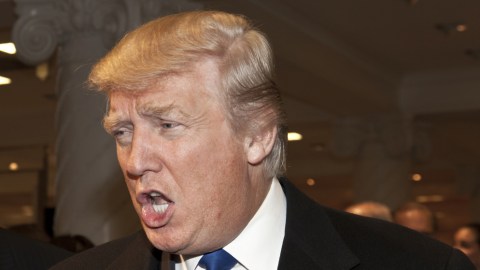Penn Jillette: Why I Like Donald Trump, aka Scrooge McDuck

It takes a lot to make the affable Penn Jillette dislike you. Consider Glenn Beck. “He’s a nut. I mean, he’s a deep, deep nut,” Jillette told Big Think in a previous interview. Nonetheless, while Beck might say things Jillette finds reprehensible, “he’s not trying to kill people,” the speaking member of Penn and Teller points out. “He’s not hurting children. He’s just thinking and sometimes he’s thinking half-assed.”
In sum: “I call Glenn Beck a friend,” Jillette tells us. And from the opposite end of the political spectrum, what about MSNBC host Lawrence O’Donnell, Jr? He’s a friend, too.
“I love that Lawrence O’Donnell, Jr. and Glenn Beck don’t like each other, but they both like me,” Jillette says. “I think that having strong opinions is part of the joy of being alive, and loving people in spite of those strong opinions is one of the other joys of being alive. I put Donald Trump in that category.”
Jillette is now appearing in his second season of NBC’sAll-Star Celebrity Apprentice. While he has been openly critical of the show and its host, Donald Trump, Jillette says he also relishes Trump’s role as a jester in our culture. “He kind of plays this Scrooge McDuck role in our society that’s kind of fun.”
To understand Jillette’s perspective, first consider that he is in show business. Jillette is measuring Trump, after all, as a performer. According to Jillette, Trump is playing the role of an obviously flawed character who “doesn’t get enough feedback, enough people rolling their eyes at him.” And that is at least part of the reason why Jillette sees value in watching this character on display. As Jillette puts it, Trump’s character is “a nice thing for us to all ruminate on.”
Watch the video here:
What’s the Big Idea?
“There is no contemporary parallel for the role of Fool in the court of kings,” writes The Royal Shakespeare Company of the Fool in King Lear. I agree, in part. The Shakespearean fool, at least in the case of Lear’s Fool, is at once a kind of morally neutral, non-ideological* commentator, as well as a significant part of the action. Is Donald Trump the closest thing we have to that — our nation’s honorary court jester — as some have proposed?
I don’t think so. That is to say, he hardly possesses that Shakespearean wisdom of the fool.
But even if we suppose there is something redeemable in Trump’s foolery, what exactly is the value of witnessing the man’s accidental humor? In other words, what exactly does Jillette think we ought to be ruminating on here? Here’s one solid suggestion: if we want to better understand Narcissistic Personality Disorder (NPD), writes Maria Konnikova, “a colorful spokesperson never hurts.”
That might be a good way to read Trump’s personality, but it’s still not precisely what Jillette has in mind. Jillette sees Trump as Scrooge McDuck, a cartoonish, flamboyant rich guy who — in contrast to a humanitarian like Bill Gates — is primarily out to feed his own ego (and by extension, his brand) and, most crucially, Trump plays a specific role in the social tableaux of 21st century American culture.
Jillette sees Trump as one of “these characters that swirl around us in the arts,” in the same vein, it seems, as Honoré de Balzac’s La Comédie humaine. One of the great realist writers of the 19th century, Balzac sought to investigate our “social species” in a series of novels about French society the way that biologists were then analyzing zoological species. We read Balzac’s novels today because he was incomparably successful in this endeavor. (Is there a Donald Trump archetype in Balzac’s tableaux? I would suggest the quasi-villain Vautrin, but that comparison is frustratingly imprecise.)
So more to the point: through his novels, Balzac sought to gain a better understanding of humans through their social relation to one another. And in that sense, Trump can perhaps be viewed as a useful foil for other characters. At least that is how Jillette describes Celebrity Apprentice in his book Every Day is an Atheist Holiday: “It’s venal people clawing at stupid, soulless shit in front of the modern-day Scrooge McDuck in order to stay famous.” That scenario is not, after all, that different from Blazac’s Paris in which characters literally crawl through filth to climb their way up the social ladder.
Jillette, who is demonstrably more self-reflective than just about any of his fellow cast members, takes full measure of his performance in Every Day is an Atheist Holiday and also in this confession to Big Think here. Jillette says his sense of self was simply worn out through exhausting taping sessions in which he had to endure Trump pontificating about everything from Occupy Wall Street to global warming. The entire cast was duly compelled to “suck up” to Trump throughout, according to Jillette, due to the rules of a fake TV game, but also due to social rules that run deeper. In other words, Donald Trump’s social role is always a highly mediated performance, whether the cameras are on or off.
There is a strange logic to all of this, a Catch-22 that enthralls the minds of network executives the same way it captivates the American public. As Jon Stewart put it:
They have to put Trump on every program, spewing his crazy ideas, because his poll numbers are so high. And his poll numbers are so high because they put him on every program, spewing his crazy ideas.
At the end of last season, to apply the psychologist’s term, Jillette suffered from “ego depletion.” Only a psychologist can explain why Jillette signed on for a second season for more of the same. Nonetheless, the affable Jillette says he glimpses Trump’s humanity. “I wish I’d got to spend more time with Donald Trump speaking freely,” he tells us.
*In all due respect to The Royal Shakespeare Company, it is absolute nonsense to view any character in King Lear as “non-ideological.” After all, as scholars liken Len Tennenhouse have argued, the British saw the King onstage as a “bare-forked animal,” essentially naked without his crown, got very used to this idea, and then cut the real guy’s head off. The Fool was hardly an innocent bystander in this regicide.
Image courtesy of Shutterstock.





